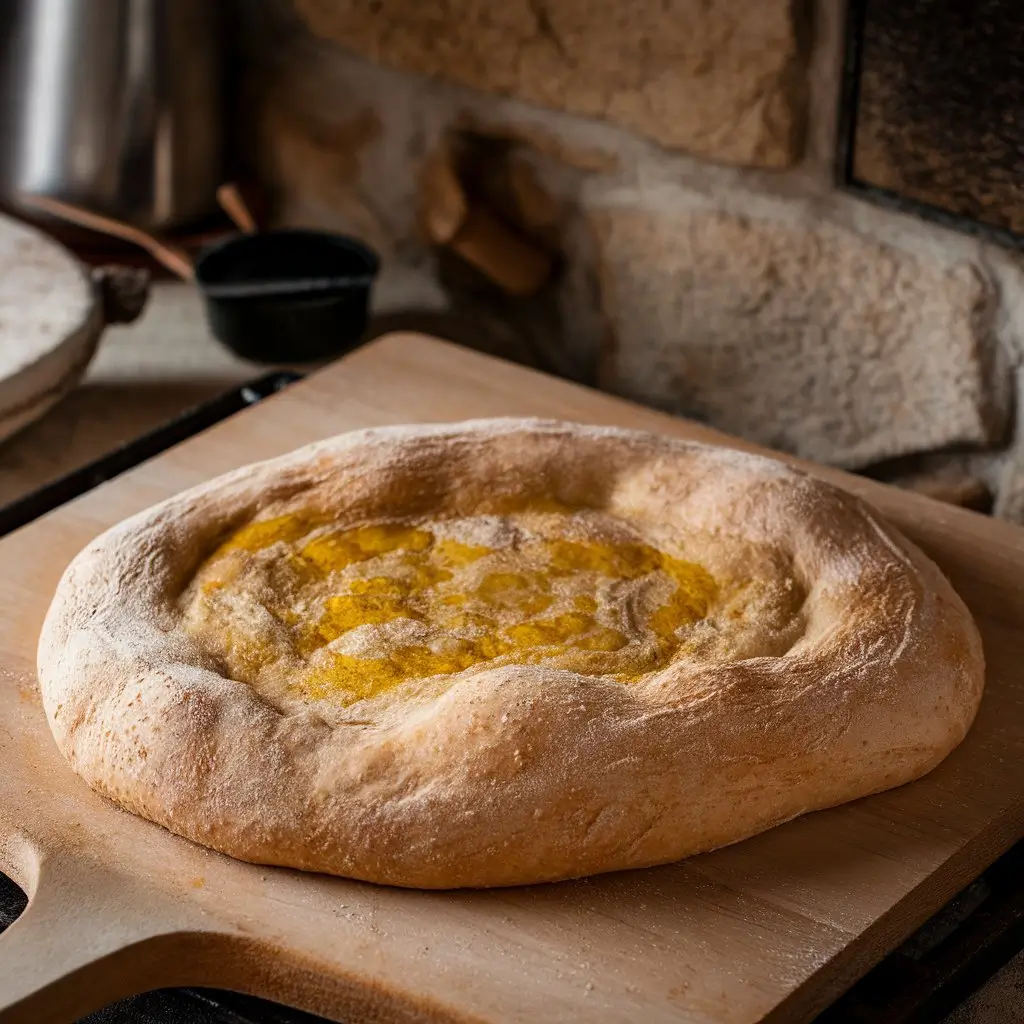Making delicious homemade pizzas is a joy I cherish. It starts with the right sourdough pizza dough. Combining simple ingredients creates a masterpiece that brings people together.
This easy-to-follow recipe helps you make a pizza dough that’s not only tasty but also has sourdough’s unique flavors. Whether you’re experienced or new, this guide will help you get perfect results every time.
Key Takeaways
- Simple ingredients for a delicious homemade pizza
- Easy-to-follow steps for crafting the perfect sourdough pizza dough
- Tips for achieving the best flavor and texture
- Variations for customizing your pizza dough recipe
- Common mistakes to avoid when making sourdough pizza dough
The Magic Behind Homemade Pizza
Homemade pizza is a culinary adventure. It lets you try endless toppings, flavors, and textures. The dough is key, and sourdough pizza dough makes it special.
Why Sourdough Creates Superior Crust

Sourdough pizza dough has a crust that’s both tasty and textured. The natural fermentation process makes it stand out. It’s better than regular pizza dough.

My Personal Sourdough Pizza Journey
My sourdough pizza journey started with trying new things and being patient. Keeping a healthy sourdough starter is important. Also, letting the dough ferment well is key. It takes time, but the result is a crust that’s both delicious and unique.
Essential Ingredients for Sourdough Pizza Dough
Making sourdough pizza dough starts with picking the best ingredients. To make a tasty pizza, knowing each ingredient’s role is key.
Flour Options and Recommendations
Choosing the right flour is key for great sourdough pizza dough. High-protein flours like bread flour or Caputo flour are best. They give the dough strength and structure. You can also try ancient grains for a special flavor.
Substitutions for Different Flour Types
If you can’t find bread flour, all-purpose flour is a good substitute. But the taste might be a bit different. For a unique taste, use whole wheat flour or mix different flours.

Sourdough Starter Preparation
A healthy sourdough starter is the heart of your pizza dough. To make it, mix equal parts flour and water in a clean container. Let it ferment. Regular feeding makes it active and bubbly.
Signs Your Starter is Ready to Use
Your starter is ready when it’s frothy and bubbly. It should double in size after feeding and smell tangy. These signs mean your starter is active and ready to make your pizza dough rise.
By focusing on these essential ingredients and understanding their roles, you can create a sourdough pizza dough that is both delicious and authentic.
Tools and Equipment for Success
The right tools can make a big difference in making delicious sourdough pizzas at home. With the right equipment, you’ll be on your way to making amazing sourdough pizza dough. It will be just as good as your favorite pizzeria’s.
Essential Kitchen Tools
You’ll need some basic kitchen tools to start. You’ll need a large mixing bowl for mixing ingredients. A dough scraper is great for handling the dough. And, a lightly floured surface is perfect for kneading.
A digital scale is also key. It helps you measure ingredients accurately.
Optional Equipment for Professional Results
While not essential, some optional tools can help you get professional results. A pizza stone can make your crust crisper. And, a stand mixer with a dough hook attachment can make kneading easier.
A proofing basket or banneton can also help. They help shape your dough and create a more artisanal crust.
| Equipment | Purpose | Essential/Optional |
|---|---|---|
| Large Mixing Bowl | Combining ingredients | Essential |
| Dough Scraper | Handling dough | Essential |
| Pizza Stone | Enhancing crust crispiness | Optional |
| Stand Mixer with Dough Hook | Simplifying kneading | Optional |
Step-by-Step Sourdough Pizza Dough Recipe
To make the perfect sourdough pizza, you must learn the pizza dough recipe. This means knowing how to mix, ferment, and shape the dough.
Mixing and Initial Dough Development
Start by mixing the ingredients. Use 500g of flour, 350ml of water, and 200g of sourdough starter in a bowl. Mix until it forms a shaggy mass. Then, cover it with a damp cloth and rest for 20 minutes.
This step is called autolyse. It helps develop the dough’s texture.
Stretch and Fold Technique
Next, use the stretch and fold technique. Gently stretch the dough and fold it back. Do this every 30 minutes for 2 hours. This method develops gluten and spreads yeast evenly.
| Stretch and Fold Cycle | Time Interval | Action |
|---|---|---|
| 1st Cycle | 30 minutes | Stretch and fold |
| 2nd Cycle | 1 hour | Stretch and fold |
| 3rd Cycle | 1.5 hours | Stretch and fold |
| 4th Cycle | 2 hours | Stretch and fold |
Bulk Fermentation Process
After the last stretch and fold, let the dough ferment. This can take 4 to 6 hours, depending on the starter’s strength. The dough is ready when it’s bigger and has big bubbles.
Dividing and Pre-shaping
Once fermented, divide the dough into parts. For a standard pizza, divide it into 2 or 4 parts. Pre-shape each part into a ball and rest for 20-30 minutes.
Final Proofing Tips
The final proofing is key. Place the dough balls on a floured surface, cover, and let them rest for 2-3 hours. They’re ready when they’re relaxed and easy to stretch.
By following these steps, you’ll make a delicious sourdough pizza dough. Happy baking!
Shaping and Baking Your Sourdough Pizza
Now that you’ve made your sourdough pizza dough, it’s time to shape and bake it. Shaping is an art that takes practice, but with these tips, you’ll get the hang of it quickly.
Hand-Stretching Techniques
To shape your dough, start by stretching it into a circle or rectangle. Use your hands to stretch and fold the dough, creating a crust edge. This helps develop the gluten, making your crust better.
Tips for Hand-Stretching: Make sure to flour your surface well to prevent sticking. Don’t overwork the dough, as this can make the crust dense.
Optimal Baking Methods
Baking is when your sourdough pizza dough really shines. The right baking method can make a big difference in getting a crispy crust and well-cooked toppings.
Using a Pizza Stone or Steel
A pizza stone or steel is perfect for baking sourdough pizzas. They distribute heat evenly and absorb moisture, leading to a crispy crust. Preheat your stone or steel in the oven at the highest temperature for at least 30 minutes before baking.
Cast Iron Pan Alternative
If you don’t have a pizza stone or steel, a cast iron pan is a good substitute. Preheat the pan in the oven, then place your shaped dough inside and add toppings. The cast iron keeps heat well, cooking your pizza evenly.
By mastering shaping and baking, you’ll make delicious sourdough pizzas. Try different toppings and baking methods to find your favorite.
Troubleshooting Common Sourdough Pizza Problems
Making tasty sourdough pizza dough takes time and effort. You might face issues with dough consistency and fermentation. Knowing how to fix these problems can greatly improve your results.
Dough Consistency Issues
Getting the right dough consistency is a common challenge. If it’s too sticky, add a little flour. If it’s too dry, a bit more water is needed. Finding the perfect balance is key.
To prevent tough crusts, mix ingredients just until they combine. Then, let the dough rest. This avoids too much gluten development.
Fermentation Challenges
Fermentation is vital for sourdough pizza dough. If it’s not rising, check your environment’s temperature. Sourdough prefers a warm, draft-free spot, around 75°F to 80°F.
If issues persist, try feeding your starter more often or adjust the flour to water ratio.
Flavor and Texture Adjustments
Adjusting proofing time and temperature can enhance flavor and texture. Longer proofing times can create deeper flavors. Shorter times result in a lighter crust.
Try different flours and toppings to find your ideal flavor and texture mix in sourdough pizza.
Conclusion: Your Path to Perfect Pizza
Now you know how to make tasty sourdough pizza. Start your pizza-making adventure with a simple recipe. Soon, you’ll have a crispy crust and a flavorful pie that’s just like your favorite pizzeria.
Try out different toppings and techniques to make your sourdough pizza unique. Don’t hesitate to mix new ingredients and flavors. This way, you’ll create pizzas that will wow your friends and family.
With this easy recipe, you’re on your way to becoming a sourdough pizza pro. So, get creative and start making your own delicious sourdough pizzas today!
FAQ
What type of flour is best for sourdough pizza dough?
Use high-protein flour like bread flour or all-purpose flour with high protein. This makes the crust robust. Try ancient grain or whole wheat flours for unique flavors.
How do I know if my sourdough starter is ready to use?
Your starter is ready when it’s bubbly, frothy, and almost doubles in size fast. It should smell tangy and slightly sour.
Can I make sourdough pizza dough without a pizza stone or steel?
Yes, you can make great sourdough pizza without a stone or steel. Use a cast iron pan or baking sheet. The crust might not be as crispy, though.
How long does it take to make sourdough pizza dough from scratch?
Making sourdough pizza dough takes time. It involves a 4-6 hour bulk fermentation and 1-2 hours of final proofing.
Can I freeze sourdough pizza dough?
Yes, you can freeze sourdough pizza dough. Wrap it tightly in plastic or foil and freeze for up to 3 months. Thaw in the fridge or at room temperature before using.
What are some common issues with sourdough pizza dough and how can I troubleshoot them?
Issues include over-proofing, under-proofing, and dough consistency. Check the dough’s temperature and proofing time. Use the right flour type.
How do I achieve a crispy crust with sourdough pizza?
For a crispy crust, pre-bake the crust before adding toppings. Bake at 500°F for 10-12 minutes.


